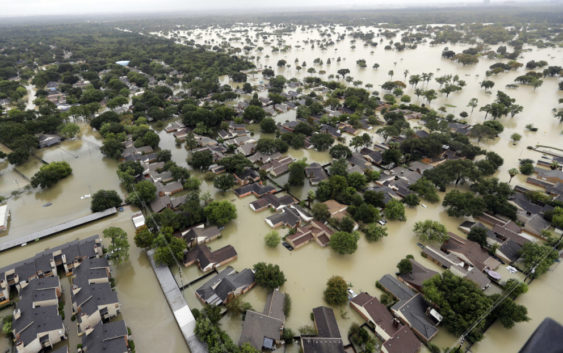- Seven months after Hurricane Helene, Chimney Rock rebuilds with resilience
- Wildfire in New Jersey Pine Barrens expected to grow before it’s contained, officials say
- Storm damage forces recovery efforts in Lancaster, Chester counties
- Evacuation orders lifted as fast-moving New Jersey wildfire burns
- Heartbreak for NC resident as wildfire reduces lifetime home to ashes
Nearly 3 Years On, Few Houston Homeowners Have Been Reimbursed For Harvey Repairs

In this Aug. 29, 2017 photo, water from the Addicks Reservoir flows into neighborhoods from floodwaters brought on by Tropical Storm Harvey in Houston.
Listen to the story audio:Your browser does not support the audio element.
Hurricane Harvey caused billions of dollars in damage to Houston. Now, nearly three years later, the City of Houston and the State of Texas are fighting over who should pay out the federal aid – and are blaming each other for the interminable delays. Thousands of Houstonians are caught in the middle while the two sides point fingers.
One of those Houstonians is Leslie Friedrich, who lives in a townhome in Houston’s west Memorial neighborhood. Her development was flooded during Harvey when the Army Corps of Engineers released water from the Addicks and Barker reservoirs.
“We had a mandatory evacuation when they had the last release, because we had about 4 feet of water here,” Friedrich said. “So, we all had to be evacuated by boat, all 194 townhomes.”
Friedrich said she was fortunate. She stayed with friends and relatives for six months while her home was rebuilt. But her insurance didn’t pay for all her repairs. She maxed out her credit cards and borrowed against her 401(k) to pay for the rest.
“I had about $35,000 worth of repairs that my insurance did not pay for,” she said. So, when the City of Houston announced the Harvey Homeowners Assistance Program, Friedrich applied.
What followed was two years of paperwork, inspections, and delay after delay. And the interest on her debt continued to hammer her. Finally, this April, Friedrich got an answer from the city.
“They spent…$6.90 to send me a certified letter, saying that while I was eligible for the Harvey Homeowners Assistance Program, I had no unmet needs,” Friedrich said. “Now, how vague is that?”
The bottom line: she doesn’t qualify.
Friedrich is hardly alone in her frustration. According to the City of Houston’s records, over 9,000 homeowners have been invited to apply for assistance. But as of April, less than 1 percent – only 50 people – had received a reimbursement check. Another 70 people have gotten the green light from the city to rebuild.
“This is lagging far behind projections of where they need to be in order to spend this money within the required six years that HUD has allowed,” said Brittany Eck, communications director for the Texas General Land Office’s disaster recovery effort.
In April, the land office notified Houston it intended to take over the billion-dollar recovery effort to rebuild homes.
“These numbers are insufficient in the home repair program,” said Tom McCasland, who runs Houston’s Housing and Community Development Department. But whose fault is that?
“I’m furious about where they are,” McCasland said, “and we are ready to work with [the General Land Office] to make the changes necessary to make sure people get served.”
McCasland said it’s the state’s land office that’s to blame for why the recovery is moving so slowly because he says state officials require so much paperwork before repairs can proceed. He said Texas has more red tape than Louisiana after Katrina or New York after Sandy.
“To come in and suggest that, as a result of the program that they control the approval on, they’re going to take over the entire program is a slap in the face to every municipality in the state,” McCasland said.
That may be, but a state takeover would make some Houston homeowners, like Lloyd Nelms, happy. Nelms was flooded out of his home in Northeast Houston on the fourth day of Harvey. He spent over two years waiting for the city to help before the state offered to build him a new house in March.
“I think the Texas General Land Office are doing an awesome job,” Nelms said. “They were transparent from beginning to end…What the City of Houston told me they [were] doing with the last two and a half to three years, they have done in less than 45 days.” Nelms moved into his new house ahead of schedule, this May.
As for Leslie Friedrich, flooded by the reservoirs’ release, she’s appealing the city’s ruling and still trying to get reimbursed.